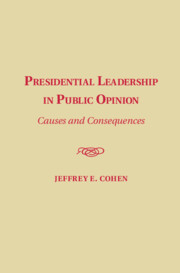Book contents
- Frontmatter
- Contents
- Figures
- Tables
- Acknowledgments
- 1 The Many Meanings of Presidential Leadership
- 2 Evidence of the Public Demand for Presidential Leadership
- 3 Congressional Sources of the President's Leadership Image
- 4 Success in Congress and Perceptions of Presidential Strength
- 5 Presidential Representation and Public Opinion
- 6 Presidential Leadership and Presidential Elections
- 7 Perceptions of Presidential Leadership, Trust in Government, and Attitudes toward Congress
- 8 Presidential Leadership, Public Opinion, and American Democracy
- Sources
- Index
4 - Success in Congress and Perceptions of Presidential Strength
Published online by Cambridge University Press: 05 May 2015
- Frontmatter
- Contents
- Figures
- Tables
- Acknowledgments
- 1 The Many Meanings of Presidential Leadership
- 2 Evidence of the Public Demand for Presidential Leadership
- 3 Congressional Sources of the President's Leadership Image
- 4 Success in Congress and Perceptions of Presidential Strength
- 5 Presidential Representation and Public Opinion
- 6 Presidential Leadership and Presidential Elections
- 7 Perceptions of Presidential Leadership, Trust in Government, and Attitudes toward Congress
- 8 Presidential Leadership, Public Opinion, and American Democracy
- Sources
- Index
Summary
“Winning isn't everything, it's the only thing”
Vince Lombardi, Fordham University Football Star and Coach
“America loves a winner. America will not tolerate a loser.”
General George S. Patton, Final Pep Talk Speech to U.S. Troops before
D-Day Invasion, May 17, 1944
This chapter turns to the second major question of the theory of public perceptions of presidential leadership – the factors that affect those perceptions. The theory identified at least three possible sources of those perceptions – voter projection of leadership qualities onto the president, the individual traits of presidents, and presidential behavior and performance in office. Although this chapter will address each of these factors, the greatest emphasis will be given to presidential performance – in particular, presidential relations with Congress. As detailed in Chapter One, due to the importance accorded to and the volume of news on presidential relations with Congress, such relations should have strong and significant effects on voter perceptions of presidential leadership.
The theory of public perceptions suggests two hypotheses that link relations with Congress to perceptions of presidential leadership: (1) Presidential positions on roll calls should affect whether voters think the president is a good representative or not. (2) Presidential success on those roll calls should affect whether voters think the president is strong versus weak. Unfortunately, I am unable to test the positions-representation hypothesis directly because, to my knowledge, no poll asks voters whether they think a president is a good representative or not. Later in this study, I test this hypothesis indirectly by looking at whether policy distance, a measure of presidential representation, affects approval of the president. Thus, this chapter only tests the linkage between success and perceptions of strength.
- Type
- Chapter
- Information
- Presidential Leadership in Public OpinionCauses and Consequences, pp. 63 - 106Publisher: Cambridge University PressPrint publication year: 2015



